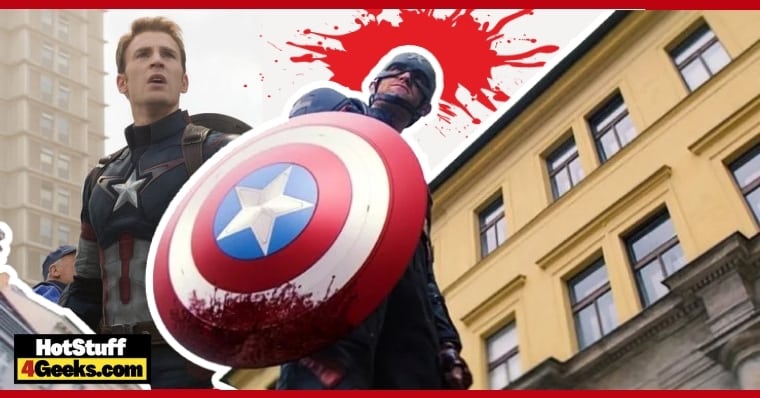With its fourth episode airing,
The Falcon and the Winter Soldier is entering its final stages. In the newest chapter, the series sets out to deconstruct its characters and its own narrative, working on what makes
Captain America such a great symbol for
Marvel's Cinematic Universe. As far as hidden surprises and connections go, we have a more restrained episode, but that doesn't mean we don't get some great special appearances and links to the comics. So here you can see
all the easter eggs and references found in the fourth episode of The Falcon and the Winter Soldier! Wakanda
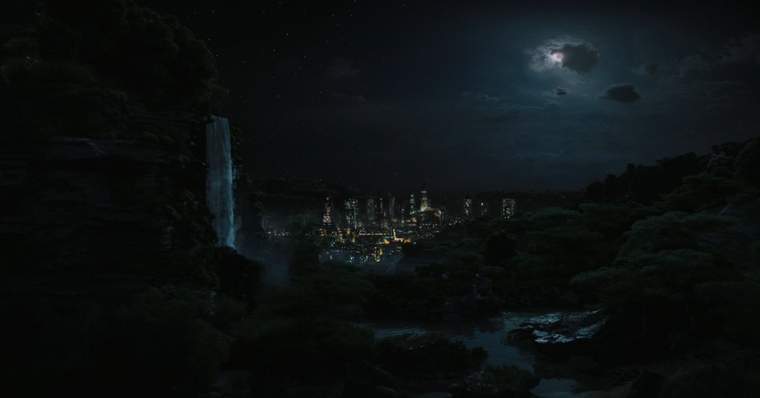
The episode begins by offering us a flashback of the
Winter Soldier. At the same time, he was still a refugee in the African nation of
Wakanda, sometime after the events of
Captain America: Civil War. In the scene, we have the beautiful moment when Bucky Barnes is free of all the brainwashing done to him by
HYDRA. Here we can see
Ayo (played by
Florence Kasumba, who had already appeared in the previous episode) reciting the words that activate all the "programming" of the Winter Soldier. Bucky then realizes that he can no longer react to these words, no longer becoming an obedient killing machine as he hears them.
Lethal Memories
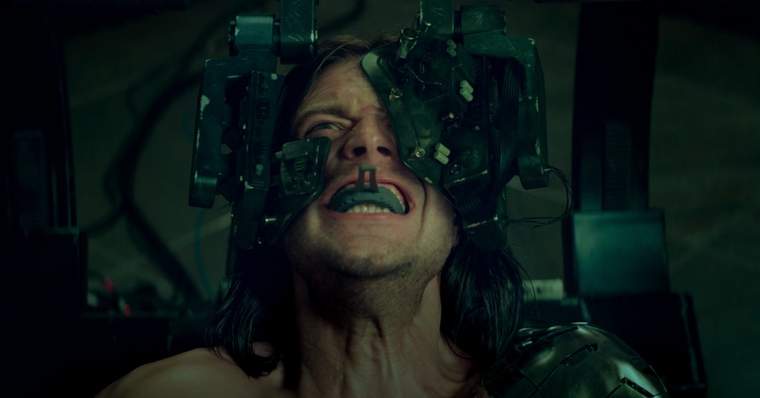
Incidentally, upon hearing words like Longing, Rusted, and Seventeen,
Bucky Barnes begins to remember various moments from his past life as the
Winter Soldier. At this point, we have flashbacks to other MCU films, such as
Captain America: The Winter Soldier and
Civil War, among others. Here, we get to see some of the assassin's missions, like when he killed
Tony Stark's parents. The scene is quite emotional, especially for
Sebastian Stan's monstrous performance. Still, it also shows us the series' concern in honoring the characters' legacy and connecting to what had already been established so far.
The myth of superheroes
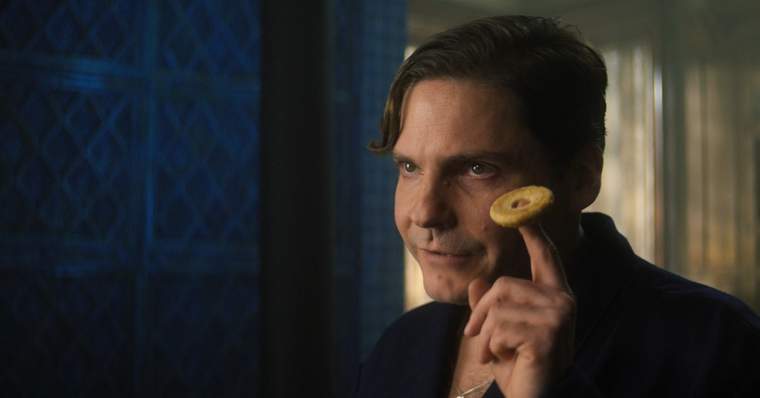
Shortly after this special flashback, we have a moment where
Bucky Barnes and
Sam Wilson talk to
Helmut Zemo about the Stateless, John Walker, and even new super-soldiers appearance. The whole conversation is quite interesting as it offers us a bit of Zemo's ideology regarding superheroes. It is common to see satires and parodies of these characters in productions such as The Boys and Watchmen. Still, we rarely see universes from major publishers discussing and deconstructing superheroes. Here, Zemo talks about how human helplessness and blind faith leads to the creation of idols and monsters, such as the
Nazis,
Ultron, and even the
Avengers.
Sam, the Counselor
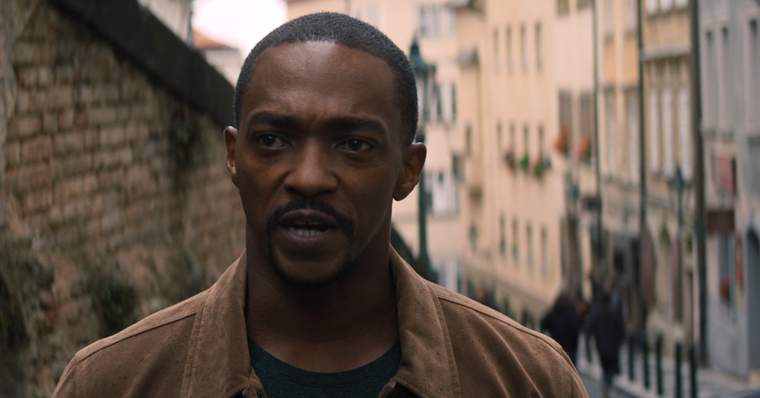
When searching for the
Stateless Persons, Sam tries to use a different approach to connect with them. This is best expressed in the scene where he, Bucky, and Zemo meet the new
Captain America and
Battlestar, which results in a brief discussion regarding how they should approach the terrorists. Sam then talks about how he wants to have a civilized conversation that appeals to
Karli Morgenthau's human side, as he has been a counselor to veterans about trauma and the effects of grief. This information first appeared in
Captain America: The Winter Soldier and was Sam's "profession" before returning to action as the
Falcon.
An Optimistic, Idealistic Captain America
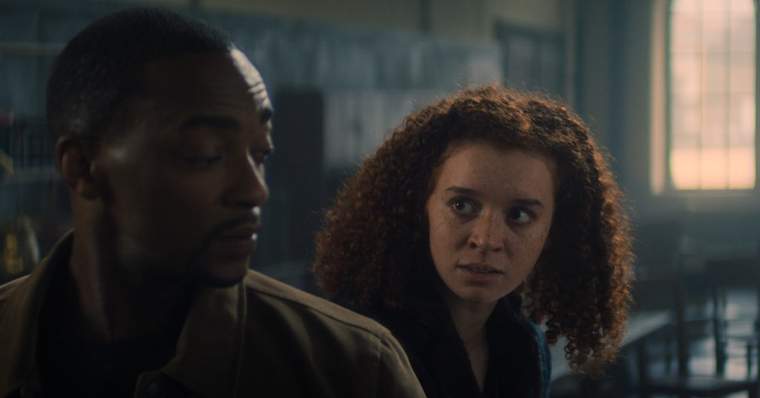
Soon after, we get the heart-to-heart between
Sam Wilson and
Karli Morgenthau. The scene is quite interesting for offering us insight into this ideological conflict and showing the Sam of the MCU's parallels with his comic book counterpart, who has already become
Captain America in a prestigious story arc. Sam differs from
Steve Rogers in many ways, and we can notice this in the series. He is even more idealistic so that he tries to understand conflicts from the point of view of minorities. Interestingly, the conversation with Karli causes Sam to begin to doubt the very system he is in.
Dora Milaje on the Attack

If the beginning of the episode features a brief appearance of Ayo and a flashback to Wakanda, there is a moment when this universe is brought back in all its glory. This happens when the
Dora Milaje, the royal guards of Wakanda, are sent to capture
Zemo. They arrive unannounced, spear in hand and ready for combat. The scene reminds us of this army's particular fighting style, as already shown in
Black Panther. They attack without restraint, giving
John Walker a real beating and even disabling the
Winter Soldier's Vibranium arm. For fans of these characters, this is a splendid and fascinating scene.
Knife Fight

Near the end of the episode, we get a big fight scene involving several characters, such as the
Falcon, the
Winter Soldier, and the new
Captain America, altogether against the Stateless People. And it is right here that we get a reference to
Captain America: The Winter Soldier when Bucky Barnes goes into battle. He takes a knife in his hand and begins dueling with one of the Stateless. The scene closely mirrors the fight that Bucky had against
Steve Rogers in the second Sentinel of Liberty movie, proving that one of the character's specialties is precise handling and fighting with bladed weapons.
Striking Parallels

The episode features several parallels between
John Walker and
Steve Rogers, which are very well hidden in the plot's subtext. However, instead of illustrating these parallels as similarities between the characters, the series tries to bring them in to show how different the two Captain America's are from each other, especially in how they act and react to situations. In the episode, we have the Battlestar's death (which mirrors the scene where Steve "loses" Bucky Barnes in
Captain America: The First Avenger). Towards the end of the episode, we see John violently murdering a Stateless Man with his shield, reminiscent of the scene in
Civil War where Steve spares
Tony Stark's life even as he destroys the Arc Reactor on his armor.
 The episode begins by offering us a flashback of the Winter Soldier. At the same time, he was still a refugee in the African nation of Wakanda, sometime after the events of Captain America: Civil War. In the scene, we have the beautiful moment when Bucky Barnes is free of all the brainwashing done to him by HYDRA. Here we can see Ayo (played by Florence Kasumba, who had already appeared in the previous episode) reciting the words that activate all the "programming" of the Winter Soldier. Bucky then realizes that he can no longer react to these words, no longer becoming an obedient killing machine as he hears them.
The episode begins by offering us a flashback of the Winter Soldier. At the same time, he was still a refugee in the African nation of Wakanda, sometime after the events of Captain America: Civil War. In the scene, we have the beautiful moment when Bucky Barnes is free of all the brainwashing done to him by HYDRA. Here we can see Ayo (played by Florence Kasumba, who had already appeared in the previous episode) reciting the words that activate all the "programming" of the Winter Soldier. Bucky then realizes that he can no longer react to these words, no longer becoming an obedient killing machine as he hears them.  Incidentally, upon hearing words like Longing, Rusted, and Seventeen, Bucky Barnes begins to remember various moments from his past life as the Winter Soldier. At this point, we have flashbacks to other MCU films, such as Captain America: The Winter Soldier and Civil War, among others. Here, we get to see some of the assassin's missions, like when he killed Tony Stark's parents. The scene is quite emotional, especially for Sebastian Stan's monstrous performance. Still, it also shows us the series' concern in honoring the characters' legacy and connecting to what had already been established so far.
Incidentally, upon hearing words like Longing, Rusted, and Seventeen, Bucky Barnes begins to remember various moments from his past life as the Winter Soldier. At this point, we have flashbacks to other MCU films, such as Captain America: The Winter Soldier and Civil War, among others. Here, we get to see some of the assassin's missions, like when he killed Tony Stark's parents. The scene is quite emotional, especially for Sebastian Stan's monstrous performance. Still, it also shows us the series' concern in honoring the characters' legacy and connecting to what had already been established so far.  Shortly after this special flashback, we have a moment where Bucky Barnes and Sam Wilson talk to Helmut Zemo about the Stateless, John Walker, and even new super-soldiers appearance. The whole conversation is quite interesting as it offers us a bit of Zemo's ideology regarding superheroes. It is common to see satires and parodies of these characters in productions such as The Boys and Watchmen. Still, we rarely see universes from major publishers discussing and deconstructing superheroes. Here, Zemo talks about how human helplessness and blind faith leads to the creation of idols and monsters, such as the Nazis, Ultron, and even the Avengers.
Shortly after this special flashback, we have a moment where Bucky Barnes and Sam Wilson talk to Helmut Zemo about the Stateless, John Walker, and even new super-soldiers appearance. The whole conversation is quite interesting as it offers us a bit of Zemo's ideology regarding superheroes. It is common to see satires and parodies of these characters in productions such as The Boys and Watchmen. Still, we rarely see universes from major publishers discussing and deconstructing superheroes. Here, Zemo talks about how human helplessness and blind faith leads to the creation of idols and monsters, such as the Nazis, Ultron, and even the Avengers.  When searching for the Stateless Persons, Sam tries to use a different approach to connect with them. This is best expressed in the scene where he, Bucky, and Zemo meet the new Captain America and Battlestar, which results in a brief discussion regarding how they should approach the terrorists. Sam then talks about how he wants to have a civilized conversation that appeals to Karli Morgenthau's human side, as he has been a counselor to veterans about trauma and the effects of grief. This information first appeared in Captain America: The Winter Soldier and was Sam's "profession" before returning to action as the Falcon.
When searching for the Stateless Persons, Sam tries to use a different approach to connect with them. This is best expressed in the scene where he, Bucky, and Zemo meet the new Captain America and Battlestar, which results in a brief discussion regarding how they should approach the terrorists. Sam then talks about how he wants to have a civilized conversation that appeals to Karli Morgenthau's human side, as he has been a counselor to veterans about trauma and the effects of grief. This information first appeared in Captain America: The Winter Soldier and was Sam's "profession" before returning to action as the Falcon.  Soon after, we get the heart-to-heart between Sam Wilson and Karli Morgenthau. The scene is quite interesting for offering us insight into this ideological conflict and showing the Sam of the MCU's parallels with his comic book counterpart, who has already become Captain America in a prestigious story arc. Sam differs from Steve Rogers in many ways, and we can notice this in the series. He is even more idealistic so that he tries to understand conflicts from the point of view of minorities. Interestingly, the conversation with Karli causes Sam to begin to doubt the very system he is in.
Soon after, we get the heart-to-heart between Sam Wilson and Karli Morgenthau. The scene is quite interesting for offering us insight into this ideological conflict and showing the Sam of the MCU's parallels with his comic book counterpart, who has already become Captain America in a prestigious story arc. Sam differs from Steve Rogers in many ways, and we can notice this in the series. He is even more idealistic so that he tries to understand conflicts from the point of view of minorities. Interestingly, the conversation with Karli causes Sam to begin to doubt the very system he is in.  If the beginning of the episode features a brief appearance of Ayo and a flashback to Wakanda, there is a moment when this universe is brought back in all its glory. This happens when the Dora Milaje, the royal guards of Wakanda, are sent to capture Zemo. They arrive unannounced, spear in hand and ready for combat. The scene reminds us of this army's particular fighting style, as already shown in Black Panther. They attack without restraint, giving John Walker a real beating and even disabling the Winter Soldier's Vibranium arm. For fans of these characters, this is a splendid and fascinating scene.
If the beginning of the episode features a brief appearance of Ayo and a flashback to Wakanda, there is a moment when this universe is brought back in all its glory. This happens when the Dora Milaje, the royal guards of Wakanda, are sent to capture Zemo. They arrive unannounced, spear in hand and ready for combat. The scene reminds us of this army's particular fighting style, as already shown in Black Panther. They attack without restraint, giving John Walker a real beating and even disabling the Winter Soldier's Vibranium arm. For fans of these characters, this is a splendid and fascinating scene.  Near the end of the episode, we get a big fight scene involving several characters, such as the Falcon, the Winter Soldier, and the new Captain America, altogether against the Stateless People. And it is right here that we get a reference to Captain America: The Winter Soldier when Bucky Barnes goes into battle. He takes a knife in his hand and begins dueling with one of the Stateless. The scene closely mirrors the fight that Bucky had against Steve Rogers in the second Sentinel of Liberty movie, proving that one of the character's specialties is precise handling and fighting with bladed weapons.
Near the end of the episode, we get a big fight scene involving several characters, such as the Falcon, the Winter Soldier, and the new Captain America, altogether against the Stateless People. And it is right here that we get a reference to Captain America: The Winter Soldier when Bucky Barnes goes into battle. He takes a knife in his hand and begins dueling with one of the Stateless. The scene closely mirrors the fight that Bucky had against Steve Rogers in the second Sentinel of Liberty movie, proving that one of the character's specialties is precise handling and fighting with bladed weapons.  The episode features several parallels between John Walker and Steve Rogers, which are very well hidden in the plot's subtext. However, instead of illustrating these parallels as similarities between the characters, the series tries to bring them in to show how different the two Captain America's are from each other, especially in how they act and react to situations. In the episode, we have the Battlestar's death (which mirrors the scene where Steve "loses" Bucky Barnes in Captain America: The First Avenger). Towards the end of the episode, we see John violently murdering a Stateless Man with his shield, reminiscent of the scene in Civil War where Steve spares Tony Stark's life even as he destroys the Arc Reactor on his armor.
The episode features several parallels between John Walker and Steve Rogers, which are very well hidden in the plot's subtext. However, instead of illustrating these parallels as similarities between the characters, the series tries to bring them in to show how different the two Captain America's are from each other, especially in how they act and react to situations. In the episode, we have the Battlestar's death (which mirrors the scene where Steve "loses" Bucky Barnes in Captain America: The First Avenger). Towards the end of the episode, we see John violently murdering a Stateless Man with his shield, reminiscent of the scene in Civil War where Steve spares Tony Stark's life even as he destroys the Arc Reactor on his armor. 
